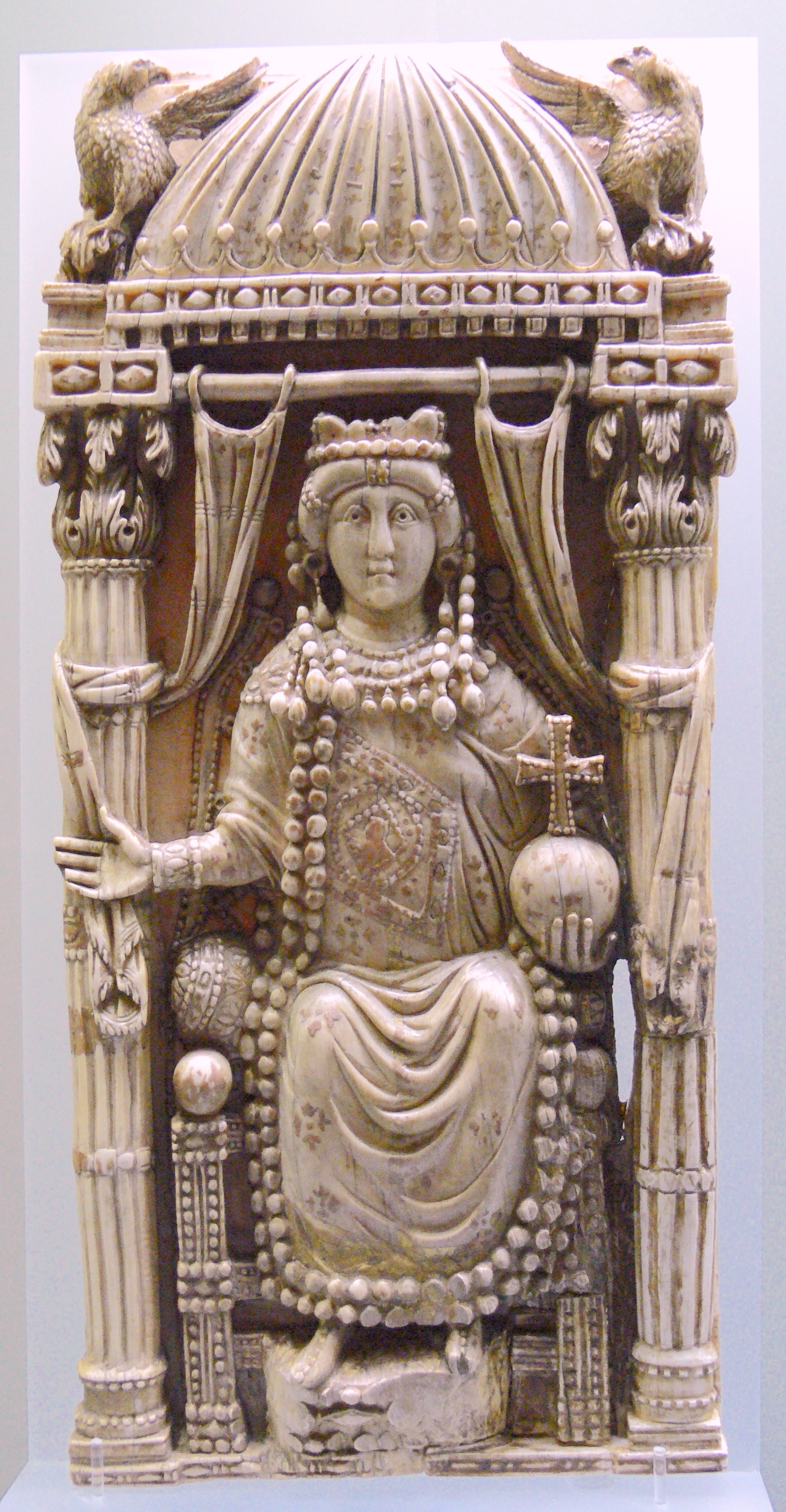|
Zeno (consul 448)
''Flavius'' Zeno (Greek: Ζήνων; ''floruit'' 447–451) was an influential general and politician of the Eastern Roman Empire, of Isaurian origin, who served as '' magister militum per Orientem'', and became consul and '' patricius''. Biography Zeno was of Isaurian originJordanes, 333; Evagrius, ii.15. and had a brother, who died before 448. Between 447 and 451 he was ''magister militum per Orientem''. In 447 he was put at the head of an Isaurian unit and entrusted with the defence of Constantinople from Attila. By this time, he was already ''magister militum per Orientem'' (Commander-in-chief of the Eastern army) and was called to defend the capital because all of the other ''magistri'' were far away, fighting against the Huns. As a reward for the successful defence of Constantinople, he was appointed consul for the year 448. In 449 and in 450 he opposed the powerful eunuch Chrysaphius, ''comes sacrarum largitionum'' at court, who wanted to obtain Attila's favour. He oppose ... [...More Info...] [...Related Items...] OR: [Wikipedia] [Google] [Baidu] |
Flavia Gens
The gens Flavia was a plebeian family at ancient Rome. Its members are first mentioned during the last three centuries of the Republic. The first of the Flavii to achieve prominence was Marcus Flavius, tribune of the plebs in 327 and 323 BC; however, no Flavius attained the consulship until Gaius Flavius Fimbria in 104 BC. The gens became illustrious during the first century AD, when the family of the Flavii Sabini claimed the imperial dignity.''Dictionary of Greek and Roman Biography and Mythology'', vol. II, p. 169"Flavia Gens". Under the Empire, the number of persons bearing this nomen becomes very large, perhaps due to the great number of freedmen under the Flavian dynasty of emperors. It was a common practice for freedmen to assume the nomina of their patrons, and so countless persons who obtained the Roman franchise under the Flavian emperors adopted the name ''Flavius'', which was then handed down to their descendants. Freedmen under the Constantinian dynasty, whose me ... [...More Info...] [...Related Items...] OR: [Wikipedia] [Google] [Baidu] |
Zeno (emperor)
Zeno (; ; – 9 April 491) was Eastern Roman emperor from 474 to 475 and again from 476 to 491. His reign was plagued by domestic revolts and religious dissension, but was more successful on the foreign front. He is credited with further stabilizing the Eastern empire, while the Western Roman Empire fell following the deposition of Romulus Augustulus. Born in Isauria, Zeno was known as Tarasis before adopting his Greek name and becoming an ally of Emperor Leo I (emperor), Leo I, who saw the Isaurian general as an important counterweight against the Germanic leader Aspar. In 466, he married Leo I's daughter, Ariadne (empress), Ariadne, with whom he had a son, Leo II (emperor), Leo. On the death of Leo I in 474, Zeno's seven-year-old son took the throne as Leo II, with Zeno made co-emperor shortly after. Leo II died of an illness later that year, leaving Zeno as the sole emperor. Despite his early success in making peace with the Vandals, Zeno was an unpopular emperor due to his ... [...More Info...] [...Related Items...] OR: [Wikipedia] [Google] [Baidu] |
Byzantine Generals
A Byzantine fault is a condition of a system, particularly a distributed computing system, where a fault occurs such that different symptoms are presented to different observers, including imperfect information on whether a system component has failed. The term takes its name from an allegory, the "Byzantine generals problem", developed to describe a situation in which, to avoid catastrophic failure of a system, the system's actors must agree on a strategy, but some of these actors are unreliable in such a way as to cause other (good) actors to disagree on the strategy and they may be unaware of the disagreement. A Byzantine fault is also known as a Byzantine generals problem, a Byzantine agreement problem, or a Byzantine failure. Byzantine fault tolerance (BFT) is the resilience of a fault-tolerant computer system or similar system to such conditions. Definition A Byzantine fault is any fault presenting different symptoms to different observers. A Byzantine failure is the los ... [...More Info...] [...Related Items...] OR: [Wikipedia] [Google] [Baidu] |
Correspondents Of Theodoret
A correspondent or on-the-scene reporter is usually a journalist or commentator for a magazine, or an agent who contributes reports to a newspaper, or radio or television news, or another type of company, from a remote, often distant, location. A foreign correspondent is stationed in a foreign country. The term "correspondent" refers to the original practice of filing news reports via postal letter. The largest networks of correspondents belong to ARD (Germany) and BBC (UK). Vs. reporter In Britain, the term 'correspondent' usually refers to someone with a specific specialist area, such as health correspondent. A 'reporter' is usually someone without such expertise who is allocated stories by the newsdesk on any story in the news. A 'correspondent' can sometimes have direct executive powers, for example a 'Local Correspondent' (voluntary) of the Open Spaces Society (founded 1865) has some delegated powers to speak for the Society on path and commons matters in their area ... [...More Info...] [...Related Items...] OR: [Wikipedia] [Google] [Baidu] |
5th-century Eastern Roman Consuls
The 5th century is the time period from AD 401 (represented by the Roman numerals CDI) through AD 500 (D) in accordance with the Julian calendar. The 5th century is noted for being a period of migration and political instability throughout Eurasia. It saw the collapse of the Western Roman Empire, which came to a formal end in 476 AD. This empire had been ruled by a succession of weak emperors, with the real political might being increasingly concentrated among military leaders. Internal instability allowed a Visigoth army to reach and ransack Rome in 410. Some recovery took place during the following decades, but the Western Empire received another serious blow when a second foreign group, the Vandals, occupied Carthage, capital of an extremely important province in Africa. Attempts to retake the province were interrupted by the invasion of the Huns under Attila. After Attila's defeat, both Eastern and Western empires joined forces for a final assault on Vandal North Africa, bu ... [...More Info...] [...Related Items...] OR: [Wikipedia] [Google] [Baidu] |
Florentius Romanus Protogenes
Florentius Romanus Protogenes (Greek: Φλωρέντιος Ρωμανός ό Πρωτογένης; ''fl.'' 448 – 451) was a Roman statesman who served as the Consul Consul (abbrev. ''cos.''; Latin plural ''consules'') was the title of one of the two chief magistrates of the Roman Republic, and subsequently also an important title under the Roman Empire. The title was used in other European city-states thro ... in 449. Bibliography * Fl. Florentius Romanus Protogenes, PLRE II, Cambridge University Press, 1980, , pp. 927–928. {{AncientRome-politician-stub 5th-century eastern Roman consuls ... [...More Info...] [...Related Items...] OR: [Wikipedia] [Google] [Baidu] |
Astyrius
Flavius Astyrius or Asturius ( 441–449) was a general and a politician of the Western Roman Empire. Biography Astyrius was the father-in-law of Merobaudes and belonged to an aristocratic family. He followed a military career: between 441 and 443 he is attested as ''dux'' or ''magister utriusque militiae''. In 441 he was in Tarraconensis (Spain), where he defeated the Bagaudae. In 443 he was succeeded by his son-in-law Merobaudes. He was appointed consul for the year 449. At the beginning of his office he was in Gaul (probably in the capital city of the praetorian prefecture, Arelate), and Nicetius delivered a panegyric in his honour. A consular diptych produced by Astyrius in 449 is preserved at Liège. The diptych shows Astyrius seated on a curule chair wearing complete consular ''regalia'' and the inscription ''Flavius Astyrius vir clarissimus'' ''et inlustris'' ''comes'' ''ex magistro utriusque militiae consul ordinarius''.Mathisen. Notes Bibliography * "Fl. Asty ... [...More Info...] [...Related Items...] OR: [Wikipedia] [Google] [Baidu] |
Rufius Praetextatus Postumianus
Flavius Rufius Praetextatus Postumianus (fl. ) was a Roman prefect and consul. He served as urban prefect of Rome in the 4th century AD. Career He served as consul and prefect of Rome from 1 January 448 AD to 31 December 448 AD. See also * Avitus Marinianus * List of urban prefects of Rome References External links Page:Dictionary of Greek and Roman Biography and Mythology (1870) - Volume 3.djvu/1405 consulate of Flavius Zeno and Flavius Rufius Praetextatus Postumianus Rufius ? (Praetextatus, Postumianus) d. 448 - Цело породично стабло {{DEFAULTSORT:Postumianus, Flavius Rufius Praetextatus Year of birth unknown 447 deaths Ancient Roman jurists 2nd-century Romans Praefecti vigilum Ancient Roman equites ... [...More Info...] [...Related Items...] OR: [Wikipedia] [Google] [Baidu] |
Ardabur (consul 447)
Ardabur (, died 471) was an Eastern Roman ''magister militum'' of Alanic descent. He was the son of the influential general Aspar. He served as consul in 447 and as ''magister militum per Orientem'' from 453 until 465 or 466. Ardabur apparently often served under his father during his campaigns. He was removed from this post in 466 after being accused of a treasonous plot involving the Sasanian Empire, probably by his father's political enemies. The accusation contributed to Aspar's fall from power. Both Ardabur and Aspar were killed in 471 as part of a conspiracy between the Isauria Isauria ( or ; ), in ancient geography, is a rugged, isolated district in the interior of Asia Minor, of very different extent at different periods, but generally covering what is now the district of Bozkır and its surroundings in the Konya P ...ns and the emperor Leo I. References 5th-century eastern Roman consuls Byzantine generals Byzantine murder victims 471 deaths Alan ... [...More Info...] [...Related Items...] OR: [Wikipedia] [Google] [Baidu] |
Priscus
Priscus of Panium (; ; 410s/420s AD – after 472 AD) was an Eastern Roman diplomat and Greek historian and rhetorician (or sophist)...: "For information about Attila, his court and the organization of life generally in his realm we have the authentic and reliable evidence of contemporary Greek historian Priscus, who accompanied Maximinus, the head of the Byzantine embassy, in 448." Biography Priscus was born in Panion (located in Thrace) between 410 and 420 AD. In 448/449 AD, he accompanied Maximinus, the head of the Byzantine embassy representing Emperor Theodosius II (r. 402–450), on a diplomatic mission to the court of Attila the Hun. While there, he met and conversed with a Greek merchant, dressed in "Scythian" (or Hunnic) fashion, who was captured eight years earlier () when the city of Viminacium (located on the Danube east of modern-day Belgrade) was sacked by the Huns.: "Priscus of Panium met one of these in Attila's camp. He was, he said, a Greek who had settl ... [...More Info...] [...Related Items...] OR: [Wikipedia] [Google] [Baidu] |
Jordanes
Jordanes (; Greek language, Greek: Ιορδάνης), also written as Jordanis or Jornandes, was a 6th-century Eastern Roman bureaucrat, claimed to be of Goths, Gothic descent, who became a historian later in life. He wrote two works, one on Roman history (''Romana (Jordanes), Romana'') and the other on the Goths (''Getica''). The latter, along with Isidore of Seville's ''Historia Gothorum'', is one of only two extant ancient works dealing with the Origin stories of the Goths, early history of the Goths. Other writers, such as Procopius, wrote works on the later history of the Goths. ''Getica'' has been the object of much critical review. Jordanes wrote in Late Latin rather than the classical Ciceronian Latin. According to his own introduction, he had only three days to review what Cassiodorus had written and so he must also have relied on his own knowledge. Life Jordanes writes about himself almost in passing: Paria was Jordanes's paternal grandfather. Jordanes writes that he ... [...More Info...] [...Related Items...] OR: [Wikipedia] [Google] [Baidu] |




